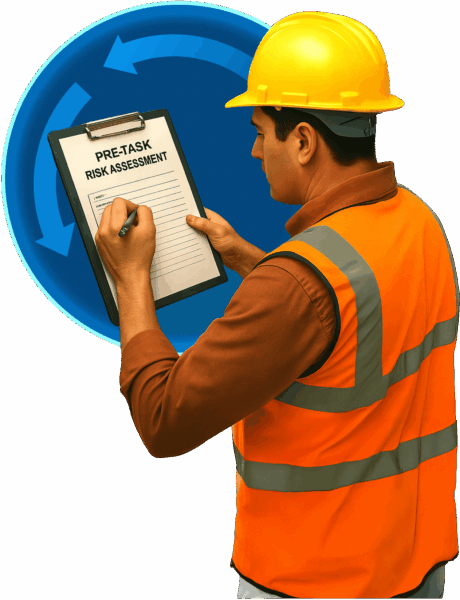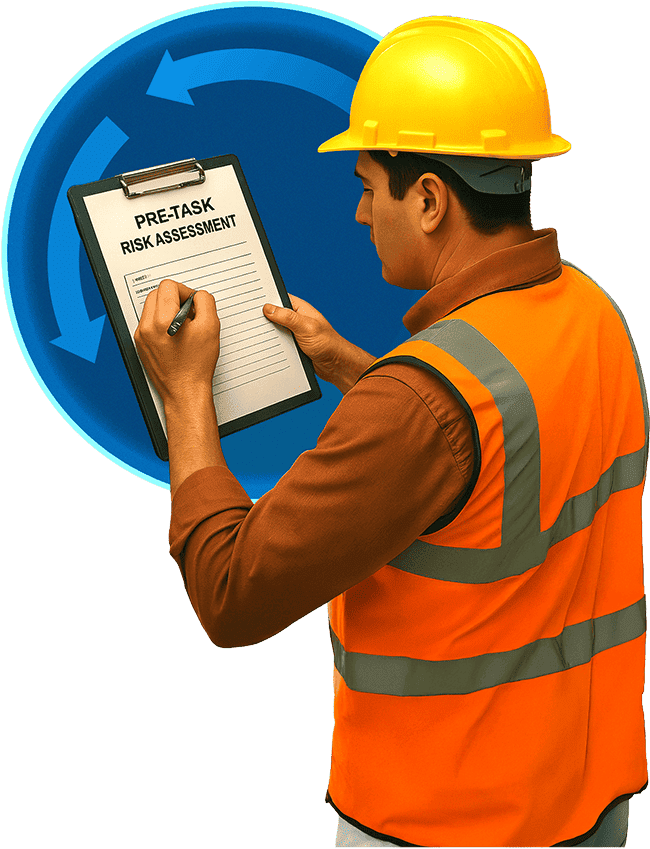From Box-Ticking to Brain-Picking
Transform
Pre-Task
Risk Assessment

How to redesign one of safety’s most widespread tools to support better decisions and safer work at the point of harm
Pre-task risk assessments are everywhere—from construction and logistics to manufacturing and energy—as a frontline tool for managing risk before work begins.
But are they really helping?
In many organisations, pre-task assessments have become a meaningless ritual:
- Workers skip them or fill them in after the job
- Experienced staff see them as a chore—not something that helps them think
- And after an incident, people often say: “The signs were there… but the form didn’t help us see them.”
Research confirms these problems—and shows that most pre-task tools fail to improve awareness, foresight, or team understanding of risk.
The issue isn’t the intent—it’s the design.
These tools were built around the wrong mental model of work. They assume all risks can be known in advance and managed through a single moment of planning.
But in the real world, safety depends on more than foresight. It requires constant evaluation, ongoing awareness, and timely decisions—especially when conditions change.
That’s where Cognitive Systems Engineering (CSE) and Safety Resilience offer a way forward.
In this free live webinar, human factors and CSE specialist Ian Pemberton shows how we can transform the pre-task risk assessment into a cognitive work tool—one that’s easier to use, better aligned with how people actually think, and far more effective at supporting real safety in the flow of work.
Are You Facing These Challenges?
- Workers not filling out pre-task risk assessments—or completing them after the work has already started?
- A culture of ambivalence—where these tools are seen as compliance exercises rather than opportunities for insight?
- That sinking feeling after an incident: “They did the form… but it didn’t help prevent this.”
- No clear path to improve the process without just adding more bureaucracy?
If this sounds familiar, this free webinar is for you.
What You’ll Learn in This Webinar
This session will show you how to rebuild the pre-task risk assessment into something more than a form—something that truly supports safety at the point of harm.
Reserve your place now.
Presented by: Ian Pemberton
Ian Pemberton is a Chartered Ergonomist, Human Factors Specialist, and a leading authority on workplace safety performance and system design. With a background in Cognitive Systems Engineering (CSE) and Safety Resilience, Ian has spent over 25 years helping organisations rethink how safety is supported—designing systems that align with real-world work and improve decision-making where it matters most.
In this session, Ian shares evidence-based insights into how CSE can be used to reframe the role of pre-task risk assessments—turning them from tick-box exercises into powerful tools for team intelligence, foresight, and safer action in complex environments.


